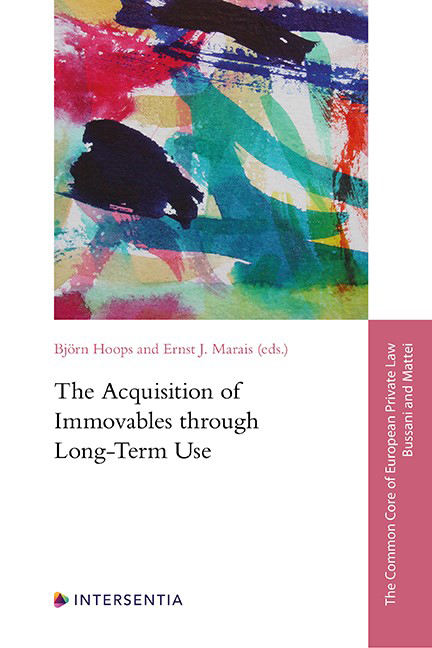Book contents
- Frontmatter
- General Editors’ Preface
- Preface
- Contents
- List of Cases
- Table of Legislation
- List of Abbreviations
- List of Contributors
- Case PART I INTRODUCTORY MATTERS
- PART II CASE STUDIES
- PART III GENERAL CONCLUSIONS
- Appendix I Instructions for the Project on the Acquisition of Immovables through Long-Term Use
- Index
Comparative Analysis – Case 6
Published online by Cambridge University Press: 26 May 2022
- Frontmatter
- General Editors’ Preface
- Preface
- Contents
- List of Cases
- Table of Legislation
- List of Abbreviations
- List of Contributors
- Case PART I INTRODUCTORY MATTERS
- PART II CASE STUDIES
- PART III GENERAL CONCLUSIONS
- Appendix I Instructions for the Project on the Acquisition of Immovables through Long-Term Use
- Index
Summary
GENERAL INTRODUCTORY REMARKS ON VARIATION 6.1.
While Variation 1.3. featured a security right registered before the start of the unlawful use, Variation 6.1. concerns a security right created after the user (Linlin) had occupied the land. For this reason, the interests of the parties involved may be balanced differently. Compared to Variation 1.3., Variation 6.1. represents a situation where it would be easier for the holder of the security right to take note of the unlawful land use in the course of an inspection and request that the user be evicted. There is thus a normative argument for putting the holder of the security right in a worse situation than if the use had started after the creation of the security right. A rather dogmatic issue is whether the acquisition through long-term use has retroactive effect, which would deprive Kouchi of the power to dispose at the moment he registered the security right.
COMPARATIVE REMARKS
The jurisdictions can be divided into three groups.
NO ACQUISITION, THUS NO EXTINGUISHMENT
In jurisdictions that do not allow for acquisitions by unlawful occupiers through long-term use, this consideration does not change the outcome and the interest of the holder of the security right will prevail. This group consists of England and Wales under the Land Registration Act of 2002, Finland, Germany, Norway, Russia, Scotland, Slovakia, and Sweden.
ACQUISITION EXTINGUISHES SECURITY RIGHT
In the second group, the interest of the acquirer through long-term use trumps the interest of the holder of the security right. In effect and, in some of these jurisdictions, in doctrine, the acquisition through long-term use has retroactive effect. The security right is rendered void by the acquisition through long-term use and the former owner could not effectively vest a security right in the holder, as if the former owner had not been owner at the moment of the creation of the security right. This group consists of Belgium, England and Wales under the Land Registration Act of 1925, France, Ireland, Italy, and Louisiana. Remarkably, this group is considerably larger than the group of jurisdictions that deem security rights created before the unlawful occupation void. This suggests that the argument put forward above may have had some impact.
- Type
- Chapter
- Information
- The Acquisition of Immovables through Long-Term Use , pp. 661 - 664Publisher: IntersentiaPrint publication year: 2022



